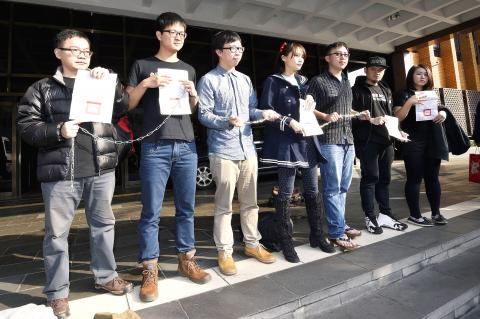The high-profile trial of eight young activists charged over an alleged incident involving China’s Taiwan Affairs Office Minister Zhang Zhijun (張志軍) began yesterday.
On June 26 last year, members of the Black Island National Youth Front allegedly blocked a road by chaining themselves together before Zhang’s tour of New Taipei City’s Wulai District (烏來) — an Atayal Aboriginal village.
Despite being swiftly removed and arrested by police officers, the activists managed to delay Zhang’s visit to the village by 20 minutes.

Photo: Chen Chih-chu, Taipei Times
Eight group members — including students Dennis Wei (魏揚) and Lai Ping-yu (賴品妤) — were indicted last month on criminal charges of coercion (強制罪) and obstruction of public traffic and communication (妨礙公共交通往來).
Group members played a key role in last year’s Sunflower movement, in which student-led protesters in Taipei occupied the legislature’s main chamber for nearly 23 days in March and April over the government’s handling of the cross-strait service trade pact.
The activists yesterday said that while their blockade denied pedestrian and vehicular access to Wulai, their goal was to stop President Ma Ying-jeou’s (馬英九) administration from “incessantly leaning toward China politically and economically.”
They asked if the administration was trying to “prevent ambassadors from the ‘celestial kingdom’ from hearing Taiwanese voices,” using an archaic term for China.
“Since the [Chinese] special ambassador was in Taiwan to discuss important issues involving economic trade — which would create a large impact on people’s livelihoods — why would the government not allow people to express their opinions?” Wei asked.
Lai said that citizens should have the right to express their opinions through protests and demonstrations, and accused the government of abusing its power through judicial channels.
Human rights lawyer Greg Yo (尤伯翔), one of the volunteer lawyers on the case, said that it was “deeply regretful” that the Taipei District Prosecutors’ Office decided to indict the activists, adding that he believed that the court would protect their freedom of speech.
If found guilty, the activists could be sentenced to up to three years in prison for coercion, and up to five years in prison for obstruction of public traffic and communication.

Alain Robert, known as the "French Spider-Man," praised Alex Honnold as exceptionally well-prepared after the US climber completed a free solo ascent of Taipei 101 yesterday. Robert said Honnold's ascent of the 508m-tall skyscraper in just more than one-and-a-half hours without using safety ropes or equipment was a remarkable achievement. "This is my life," he said in an interview conducted in French, adding that he liked the feeling of being "on the edge of danger." The 63-year-old Frenchman climbed Taipei 101 using ropes in December 2004, taking about four hours to reach the top. On a one-to-10 scale of difficulty, Robert said Taipei 101

Nipah virus infection is to be officially listed as a category 5 notifiable infectious disease in Taiwan in March, while clinical treatment guidelines are being formulated, the Centers for Disease Control (CDC) said yesterday. With Nipah infections being reported in other countries and considering its relatively high fatality rate, the centers on Jan. 16 announced that it would be listed as a notifiable infectious disease to bolster the nation’s systematic early warning system and increase public awareness, the CDC said. Bangladesh reported four fatal cases last year in separate districts, with three linked to raw date palm sap consumption, CDC Epidemic Intelligence

Taiwanese and US defense groups are collaborating to introduce deployable, semi-autonomous manufacturing systems for drones and components in a boost to the nation’s supply chain resilience. Taiwan’s G-Tech Optroelectronics Corp subsidiary GTOC and the US’ Aerkomm Inc on Friday announced an agreement with fellow US-based Firestorm Lab to adopt the latter’s xCell, a technology featuring 3D printers fitted in 6.1m container units. The systems enable aerial platforms and parts to be produced in high volumes from dispersed nodes capable of rapid redeployment, to minimize the risk of enemy strikes and to meet field requirements, they said. Firestorm chief technology officer Ian Muceus said

MORE FALL: An investigation into one of Xi’s key cronies, part of a broader ‘anti-corruption’ drive, indicates that he might have a deep distrust in the military, an expert said China’s latest military purge underscores systemic risks in its shift from collective leadership to sole rule under Chinese President Xi Jinping (習近平), and could disrupt its chain of command and military capabilities, a national security official said yesterday. If decisionmaking within the Chinese Communist Party has become “irrational” under one-man rule, the Taiwan Strait and the regional situation must be approached with extreme caution, given unforeseen risks, they added. The anonymous official made the remarks as China’s Central Military Commission Vice Chairman Zhang Youxia (張又俠) and Joint Staff Department Chief of Staff Liu Zhenli (劉振立) were reportedly being investigated for suspected “serious